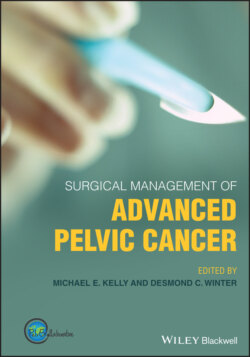Читать книгу Surgical Management of Advanced Pelvic Cancer - Группа авторов - Страница 64
Thromboprophylaxis
ОглавлениеCancer patients undergoing a surgical procedure have twice the risk of postoperative venous thromboembolism (VTE) and threefold risk of pulmonary embolism (PE) [28]. Therefore the use of prophylaxis is vital in reducing VTE events. Among pharmacological methods, low molecular weight heparin (LMWH) has some advantages to unfractionated heparin (UFH), including the ease of administration and a lower risk of hemorrhage. For these reasons, LMWH is considered the first choice [28, 29]. In addition, the use of mechanical thromboprophylactic modalities such as compression stockings or intermittent pneumatic compression devices is advocated [28].
The enoxaparin and cancer (ENOXACAN) II multicenter trial observed a 60% reduction of VTE in cancer patients who received LMWH for extended duration (four weeks) compared to those only getting it for one week, without increased risk of bleeding [29]. The cancer, bemiparin, and surgery evaluation (CANBESURE) trial also demonstrated a considerable relative risk reduction (82.4%) of major VTE in having extended prophylaxis [30]. As a result, the use of extended prophylaxis is becoming protocolized in many institutions.
